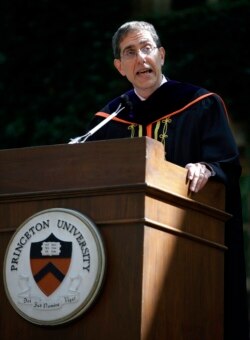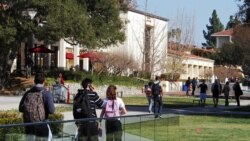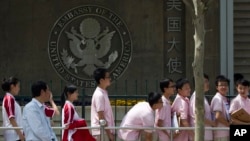Student Union
Ivy League President Calls College, University Rankings 'Daft'
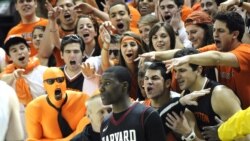
The president of Princeton University, which routinely leads the lists of best colleges and universities, advises applicants to be wary of choosing a school based on ranking lists.
"My university has now topped the U.S. News & World Report rankings for 11 years running. Given Princeton's success, you might think I would be a fan of the list," wrote Christopher Eisgruber in The Washington Post on October 21.
"Not so. I am convinced that the rankings game is a bit of mishegoss — a slightly daft obsession that does harm when colleges, parents or students take it too seriously," Eisgruber wrote, using a Yiddish word that means "senseless behavior or activity."
Rankings are highly popular and usually published around this time of year, application season for U.S. colleges and universities. An online search for "college rankings" reveals more than 66 million hits. While many companies and organizations publish such lists, the U.S. News & World Report rankings are seen as the most wide reaching.
Colleges at the top of such lists often are the hardest to get into. Low acceptance rates — less than 10% for the "best" schools — indicate those colleges receive far more applications than they have places for students.
Many applicants invest emotionally in a dream that is not likely to come true, in addition to spending up to hundreds of dollars on application fees. The colleges and universities with the highest application fees are also the most coveted and highest-ranking schools: Princeton, Harvard, Columbia, Yale, Stanford and the Massachusetts Institute of Technology.
According to the blog CollegeVine, a student applies to an average of eight to 12 schools per academic year. Fees per school can reach $100 per application, but students can request fee waivers.
Brevity over comprehensiveness
Eisgruber and others accuse U.S. News & World Report, which publishes numerous best lists on several topics each year, of capitalizing on brevity and convenience rather than comprehensive information.
U.S. News offers a lengthy explanation of its computation on its website, stating that it uses "multiple measures to capture the various dimensions of academic quality at each college. They fall into nine broad areas: graduation and retention, graduation rate performance, graduate indebtedness, social mobility, faculty resources, expert opinion, financial resources, student excellence, and alumni giving."
"The indicators include both input measures, which reflect the quality of students, faculty and other resources used in education, and outcome measures, which capture the results of the education an individual receives at the institution," it states.
U.S. News attracts "tremendous attention and a huge customer base. Their popularity has inspired many imitators," Eisgruber wrote.
These include the popular Princeton Review. The name of the publication might lead some to believe Princeton University endorses the review's choices. Not so. While the company was formed by a Princeton graduate who later founded the educational company Noodle Partners and 2U, the university has no connection with the publication.
"Don't get me wrong. I am proud of Princeton's teaching, research and commitment to service. I like seeing our quality recognized," Eisgruber said. "Applicants and their families, however, rely on the rankings and feel pressure to get into highly regarded institutions. As a result, many schools make intense efforts to move up in the rankings," he wrote.
In 2012, Claremont McKenna College in California admitted it had sent U.S. News boosted results that did not reflect the school's metrics accurately.
Eisgruber suggested applicants consult the U.S. Department of Education's College Scorecard, although the "data-centric interface can make it more attractive to policy wonks than to students."
He also wrote that he hoped "some national publication will have the courage to produce an annual, user-friendly Consumer Reports-style analysis of higher education institutions, even if it is not as beguiling as a football-style set of rankings."
He added: "Rankings, however, are a misleading way to assess colleges and universities. There are lots of great places to get an education. America's colleges and universities work collaboratively to educate the wide variety of people seeking degrees. Different schools may suit different students."
See all News Updates of the Day
- By VOA News
International students discuss US campus culture shock

International students at De Anza College in Cupertino, California, talked about culture shock in an article in La Voz News, the student newspaper.
"It felt like a major culture shock. Everything was so different, from academics to mannerism," said a student from Mexico.
Read the full story here.
These are the most expensive schools in the US
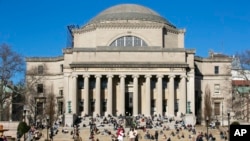
High tuition costs along with housing and food expenses can add up for students at U.S. colleges and universities.
MSNBC looked at the most expensive schools in the country, with one costing more than $500,000 for a bachelor’s degree. (June 2024)
Uzbekistan students admitted into top US universities
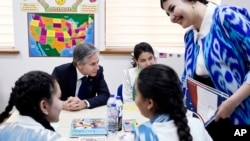
Students from Uzbekistan are among the international students admitted to top colleges and universities in recent years.
Gazata.uz profiled some of the Uzbekistan students attending Harvard, Brown, Princeton and other U.S. universities. (June 2024)
- By Stella Hsu
Reports of visa checks, deportations worry Chinese STEM students in US
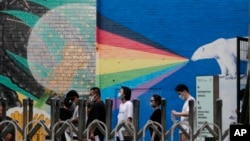
Geopolitical tensions and growing competition in tech between the United States and China appear to be spilling over into academia despite commitments from the world’s two biggest economies to boost people-to-people exchanges.
The United States remains the top choice for Chinese students seeking to study abroad with nearly 300,000 studying in American colleges and universities during the 2022-2023 school year. But reports of some cases that students and professors are facing extra scrutiny while passing through immigration and the deportation of others are raising concerns.
For Chen Xiaojin, a doctoral student studying semiconductor materials at a university in the Washington, D.C., metropolitan area, it has been six years since she returned to her hometown of Beijing.
At first, it was the COVID-19 pandemic that kept her from going home. But over the past two years, she has been deterred by accounts of Chinese students majoring in science and engineering being required to reapply for their visas upon returning to China.
She also says she is worried by reports over the past six months of Chinese students being deported, even at nearby Dulles Airport.
"My current research is relatively sensitive, and my boss [adviser] is getting funds from the U.S. Department of Defense, making it even more sensitive,” she told VOA. "I am afraid that I won't be able to return after I go back [to China]."
Chen says that if she did return to China, she would have to apply for a new visa.
In a report late last month, Bloomberg said it had found at least 20 Chinese students and scholars with valid visas who were deported at U.S. Customs since November and barred from reentry. The U.S. Customs and Border Protection Agency does not release relevant data.
Immigration attorney Dan Berger represented one Chinese student who was deported late last year. He tells VOA Mandarin that the student studied biological sciences at Yale University and was about to complete her doctorate.
She visited her family in China and got a new visa but was deported by customs at Dulles Airport and barred from reentering the country for five years. Berger said he did not see anything suspicious in the transcript of the conversation between the student and the customs officer.
"We have seen what seems like a pattern over the last six months of Chinese PhD students being turned around…. more than I've seen in quite a while," he said.
Matthew Brazil, a fellow at the Jamestown Foundation, said neither country seems willing to explain the situation. However, he believes that in most cases, the United States must have valid reasons for blocking visa holders from entering the country.
In some cases, the student’s background may not match what is written on the visa application. In other cases, customs agents may also find something that the State Department missed, and once they see it, they are responsible for taking action.
"I wish the Chinese side would be specific about their students who were refused entry,” he said. “The fact that both sides are mum on details and that the Chinese side is engaged with the usual angry rhetoric means that each has security concerns. And that says to me that there was good reason for the U.S. to stop these particular applicants."
Brazil also sees a connection between the entry denials and export control regulations issued by the United States in October 2022 that restrict China's ability to obtain advanced computing chips, develop and maintain supercomputers, and manufacture advanced semiconductors.
U.S. Customs and Border Protection is one of the law enforcement agencies authorized to investigate violations of export control regulations, he said.
"Beijing's intelligence agencies are known to focus attention on PRC [People's Republic of China] students and scientists headed abroad who study or work on dual-use technologies controlled under the Export Administration Act — compelling Chinese students and scientists to report on what they've learned when they return to China on holiday,” he said. “This has been true for decades."
Bill Drexel, a fellow for the Technology and National Security Program at the Center for a New American Security, said the U.S. government did find some cases where students tried to steal strategic technology for China.
"I think it would both not be surprising that they found some really questionable or incriminating evidence for some students,” he said. “It would also not be surprising if, in their hunt for really solid evidence, they also may have made some mistakes on other students.”
Drexel adds that “it’s just kind of an unfortunate fact of the time that we live in and the tactics that the CCP uses when it comes to these measures."
In a post on X in early May, U.S. ambassador to China Nicholas Burns tried to dispel concerns about visas and entry to the United States for students and scholars. In the post, he said "99.9% of Chinese students holding visas encounter no issues upon entering the United States.”
In an interview with The Wall Street Journal Monday, Burns said it is China that is making it impossible to promote people-to-people ties. Burns told the Journal that students attending events sponsored by the United States in China have been interrogated and intimidated.
He also said that since U.S. President Joe Biden and China’s leader Xi Jinping held their summit in San Francisco last year, China’s Ministry of State Security and other agencies had interfered with Chinese citizens’ participation at some 61 events.
At a regular briefing on Wednesday, Chinese Foreign Ministry spokesperson Mao Ning dismissed those accusations, saying that they did not “reflect reality" and that went against key understandings reached by both countries’ presidents in San Francisco.
“The United States, under the pretext of 'national security,' unjustifiably harasses, interrogates, and deports Chinese students in the U.S., causing them significant harm and creating a severe chilling effect,” Mao said. “The image of the United States in the minds of the Chinese people fundamentally depends on the actions of the United States itself.”
Drexel said he believes Burns’ comments about visas and students' willingness to study in the U.S. still ring true.
“On balance, it's still the case that American universities are overwhelmingly warm towards Chinese students and want them in large numbers," he said.
However, Berger, the immigration lawyer, is concerned about the chilling effect recent cases involving Chinese students could have.
"In general, we are being more careful about advising Chinese graduate students in STEM fields about traveling and letting them know that there is some small risk,” he said.
Even though the risk is small, it does seem to be real at the moment, he said.
Adrianna Zhang contributed to this report.
US federal judge blocks new regulation targeting for-profit colleges
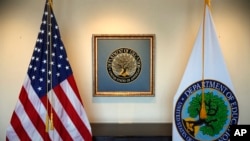
A federal judge in Texas has blocked a regulatory provision targeting for-profit colleges that was scheduled to take effect in July 2024.
Times Higher Education reports that the rule, which would affect student loans, was challenged by for-profit institutions. (June 2024)




